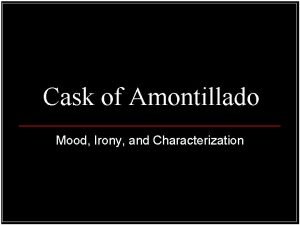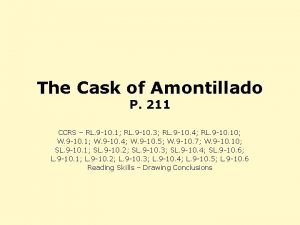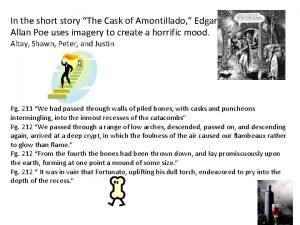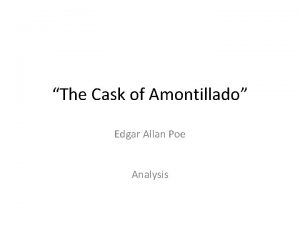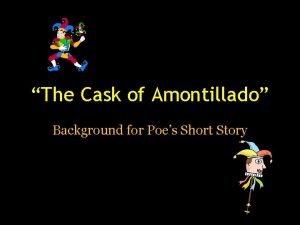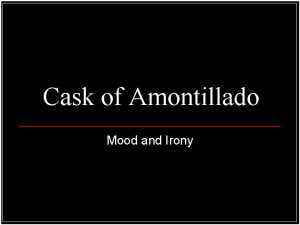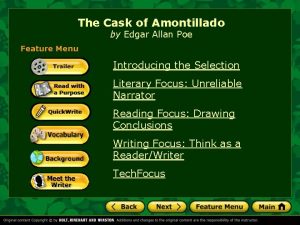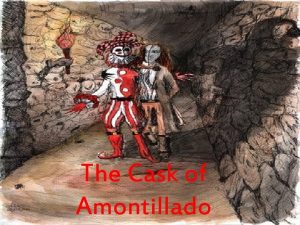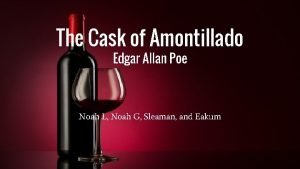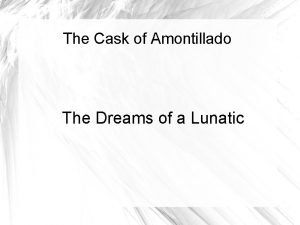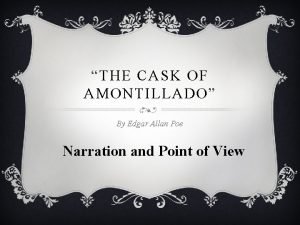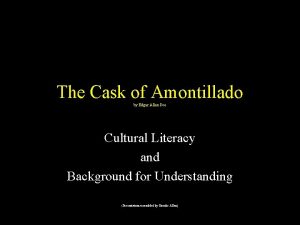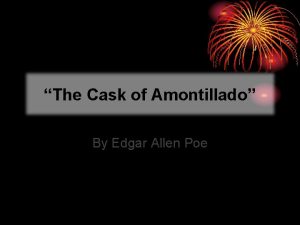The Cask of Amontillado P 211 CCRS RL











- Slides: 11

The Cask of Amontillado P. 211 CCRS – RL. 9 -10. 1; RL. 9 -10. 3; RL. 9 -10. 4; RL. 9 -10. 10; W. 9 -10. 1; W. 9 -10. 4; W. 9 -10. 5; W. 9 -10. 7; W. 9 -10. 10; SL. 9 -10. 1; SL. 9 -10. 2; SL. 9 -10. 3; SL. 9 -10. 4; SL. 9 -10. 6; L. 9 -10. 1; L. 9 -10. 2; L. 9 -10. 3; L. 9 -10. 4; L. 9 -10. 5; L. 9 -10. 6 Reading Skills – Drawing Conclusions

The Cask of Amontillado Literary Focus: Unreliable Narrator Writers sometimes assume a persona—a mask or a voice for a first-person narrator. When you read a story told by a first-person narrator, always ask yourself if you can trust the narrator.

The Cask of Amontillado Literary Focus: Unreliable Narrator An unreliable narrator may not always know the whole truth or may purposely choose to deceive us. To determine whether a narrator is reliable or not, pay attention to his or her • actions • diction—word choice • statements • tone—attitude • voice—distinctive style of speaking

The Cask of Amontillado Reading Skills: Drawing Conclusions When you read a story, you gather evidence and draw conclusions, or make judgments, based on that evidence. To decide if Poe’s narrator is reliable, look closely • at what the narrator says and does • at what Fortunato, the narrator’s enemy, says

The Cask of Amontillado Background Centuries ago, Christians in Italy buried their dead in catacombs—long, winding underground tunnels. Later, wealthy families built private catacombs beneath their homes. Dark and cool, these chambers were suitable not only for burial but also for the storage of fine wines, such as amontillado. Poe’s story is set during carnival, which is celebrated before the start of Lent, the season during which Christians give up various pleasures. During carnival, many people wear costumes and dance in the streets.

The Cask of Amontillado Vocabulary p. 210 Previewing the Vocabulary precluded v. : made impossible in advance; prevented. impunity n. : freedom from punishment or harm. retribution n. : punishment. immolation n. : destruction. connoisseurship n. : expert knowledge. impose v. (used with upon): take advantage of.

The Cask of Amontillado Vocabulary p. 210 Previewing the Vocabulary recoiling v. used as adj. : moving backward, as in fear. endeavored v. : tried. obstinate adj. : stubborn. succession n. : series.

The Cask of Amontillado Vocabulary Activity Choose the best vocabulary word to replace each underlined word or phrase. retribution succession impunity precluded endeavored 1. The criminals thought that they could operate with no fear of punishment. impunity 2. A whole series of lawyers had struggled to prove that he was guilty of the crime. succession; endeavored 3. The defense lawyer felt that the public’s desire for revenge ruled out the possibility of acquittal. retribution; precluded

The Cask of Amontillado Quickwrite Make the Connection Edgar Allan Poe was a master at writing stories of revenge. What experiences could lead someone to seek revenge? How could an obsession with vengeance lead to tragedy? Jot down your responses, and include examples from stories or movies.

While Reading – Drawing Conclusions (questions located inside story) 1. What does the narrator’s smiling at the thought of Fortunato’s death tell you about his character? (p. 212) 2. How does the narrator lure Fortunato to his palace? What does the narrator’s strategy tell you about him? (p. 213) 3. Why might Montresor be carrying a trowel? What can you conclude about his plans? (p. 215) 4. What can you conclude about Montresor’s state of mind when he stops his work to enjoy Fortunato’s cries? (p. 217) 5. Do you think Montresor’s “heart grew sick” because of the dampness or for some other reason? Support your conclusion. (p. 217)

Activity • P. 219 Questions 1 -13
 Direct characterization in the cask of amontillado
Direct characterization in the cask of amontillado The cask of amontillado verbal irony
The cask of amontillado verbal irony The cask of amontillado background information
The cask of amontillado background information Cask of amontillado drawing
Cask of amontillado drawing Imagery in the cask of amontillado
Imagery in the cask of amontillado Man vs society in the cask of amontillado
Man vs society in the cask of amontillado Characterization in the cask of amontillado
Characterization in the cask of amontillado Cask of amontillado background
Cask of amontillado background Examples of mood in the cask of amontillado
Examples of mood in the cask of amontillado The conqueror worm
The conqueror worm The cask of amontillado commonlit answers
The cask of amontillado commonlit answers Point of view of cask of amontillado
Point of view of cask of amontillado
